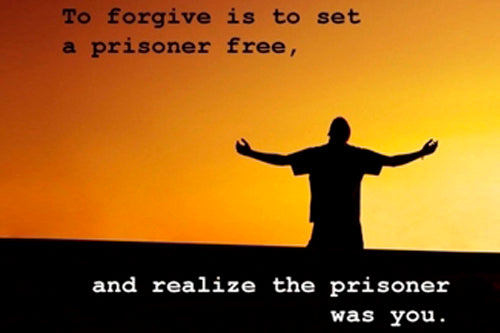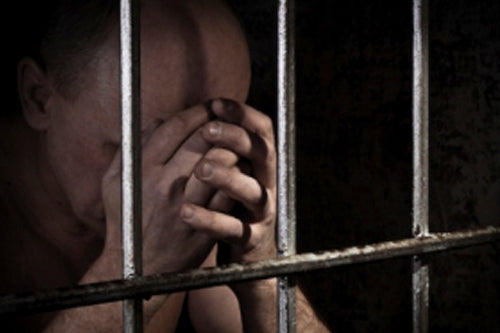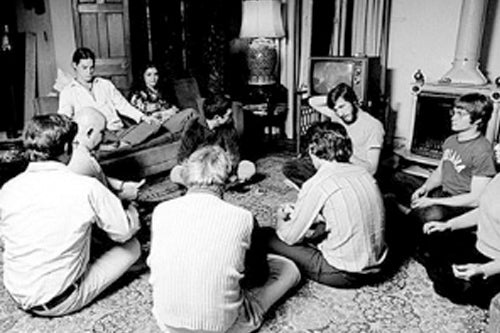I find the prison experience to be a microcosm of our life on earth. The human experience is identical: we are born, we live our life and we die. Somewhere, in between, we make our choices. We struggle and fight. Eventually, we either choose to, or are forced by circumstances, to surrender.

My last class at the prison was the most powerful one yet. We have had ten new inmates participate in this meditation. Again, as in every class, I am stunned at the faces of the men in front of me. I see life in all its manifestation. I see very strong beings, very broken down humans. My heart cries and my determination to let go and serve these people strengthens.
The inmates in my class have to surrender daily. Their line to the bathroom, a towel that is missing or a painful remark about their spouses, the only way to survive there is to let go.
Half way through the class I felt a strong surge of gratitude in my chest. My heart expanded with love to all the teachers who have given their everything to me. I felt in my heart Rudi and Nityananda. I felt Stuart and the eternal Sarada Devi.
I looked up at Richardson and I could not take my eyes off of this amazing face. Richardson is one of the new inmates. It was his first class. As the class prolonged, the defiance and suspicion in his eyes turned into quiet and openness. His words, at the end of the class, moved me deeply.
He raised his hand. “Can I say something? I come from the Ghetto in Chicago,” he said. ” The last time I felt that good and peaceful was when I was six years old and my mom told me bedtime stories. It’s the same feeling I have now.” His eyes turned moist and shiny. “Thank you,” he said.
James raised his hand, “What do we have to surrender?” he asked, “we don’t have anything anyway.” There was resignation in his voice.
“You surrender your tensions,” I said. “You let go of the ingrained, very powerful, need to be right.” He looked at me, and said “but what if I am right?”
“What good is being right?” I answered. “Ok, you are right. Then what? You are stuck with it. You play the cassette in your head again and again and there is no end in sight.”
As I talked, Rudi’s image flashed in my mind yet again. We were sitting in his store when Ern, the lady who used to run his Big Indian Restaurant, came in. She asked for $5000 for an advanced piece of equipment. She said it would save a lot of money in the long run. Rudi refused. He asked her not to buy the equipment. Ern walked out of the store and bought the machinery, despite Rudi’s refusal. Within a week, she had it working and saved the restaurant money.
The following week, Rudi went up to his podium. He started his class by complimenting Ern for not listening to him. He went on for ten minutes praising her for her courage. I witnessed a very secure man with very little personality to cloud his life.
James listened, nodding his head. “But why,” he said. “What’s the point of surrendering?”
“Somebody hurts us and we’ve got to strike back,” I answered, “We are all snakes waiting for our turn to strike, right?” Everybody laughed. “Wrong,” I said, “There is no need to strike back.”
“I get hurt a great deal. I go to my room, sit down in meditation and ask for help to surrender, surrender my tensions. I have a tremendous class and experience the energy in new places within me. Anyway, I come out of class with no need to strike back. Does it seem silly? Yes, but I go through an enormous struggle within myself. We all have this need to be right. Imagine being wrong? Gives you room to change and grow.”
“We have a fantastic tool here,” I continued, “A double-breathing exercise that can actually burn our tensions away. All we need to do is open our heart with a deep sense of gratitude and a need to surrender our tensions. You do that once or twice a day, for twenty minutes or so, and things will change. My life has changed drastically. I, too, was in prison. In some ways, worse than the one you are in. I am still climbing out of my prison.”
I saw a spark light up in one of the new people. A young kid with burnt out eyes, who could not have been more than twenty five.
“I am going to quote a saying by a great master,” I continued, “Every human being is worth more than his worst acts.” When I heard that, forty years ago, I started crying, overwhelmed by the pure compassion in these few words.

I glanced at the guards in the room. They were moving in their chairs.
Very often, while talking, I stop, uncertain of whether I am overloading the people in front of me. Within me, I understand that the only reality here is whether the actual class and the energy generated will touch someone in the room. A deeper part of me surrenders the doubts and knows that the words will reach those who are ready.
Benito raised his hand: “What do you do with the energy? Here we can go crazy with it.”
“You channel it,” I said. “You bring it down bellow your navel. You open your heart.”
“Look,” I continued, “you are all here for a reason. It doesn’t matter what you did or where you came from. Take this opportunity, these years in prison, and use it to change and grow.”
Benito looked down and nodded.
When the class was over, there was laughter and joy in this gloomy place. I wanted to go and hug these people but the rules forbade that. I decided at that moment to talk to the supervisor and change this rule.
Benito was beaming. He read a paragraph from a book he brought with him comparing happiness to a butterfly flying freely.
“Til it is caught and turns into dust particles,” Benito read. “Is that what you mean by surrendering happiness?” Benito asked.
“Yes,” I said, “you surrender happiness, share it with others or it will disappear. You can’t be stingy and hold onto it.”
“I am out of here in three years,” he said, as if talking about three weeks. His eyes were bright and gay. “After twenty years, my life starts again.” His joy was contagious, everyone laughed and a sweet murmur of voices floated over the room.
Dvorit and I drove back in silence. It was Dvorit’s first class in the prison and she was affected deeply by the experience.
I realized once again that my happiest moments are the ones I am of service to others. I love helping, either by holding the hand of a dying child in Sloane-Kettering hospital or teaching in a prison in Central California.
I am climbing out of my prison. Joyfully.




